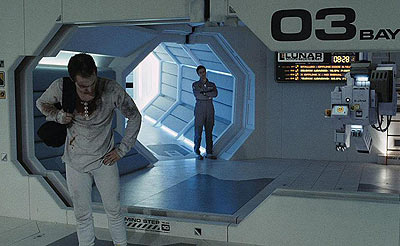Moon: Look At Yourself
Published on September 29th, 2009 in: Current Faves, Halloween, Horror, Issues, Movie Reviews, Movies, Reviews, Science Fiction |By Jemiah Jefferson
Moon is a great example of how to make an engaging, gripping science fiction film with not too much money, but a solid appreciation of cinematic and narrative possibility. It is a remarkable achievement from well-regarded journeyman actor Sam Rockwell and director Duncan Jones, who knocks it way out of the park on his first feature film.
Rockwell portrays the character of Sam Bell, a technician on a solo three-year stint supervising a mining operation on the far side of the moon. By the time we see him, Sam’s been up there all by himself for a long time, exercising on his treadmill, tending his houseplants, whittling a remarkably detailed scale model of his hometown, and communicating fitfully with his wife and young daughter back on Earth. Sam’s only companion is the solicitous, somewhat maternal robot computer interface, GERTY, who is not only voiced by Kevin Spacey, but who has a small monitor that displays AIM-style emoticons appropriate to the conversation. Sam is, understandably, kind of losing it, wearing a monstrously long beard and castaway shaggy hair; he talks to himself and takes care of business. Soon, he’ll be going home, back to his family and his life; he knows that if he can just hold out, he’ll make it.
Of course, in a scenario like this, something is bound to go catastrophically wrong; Sam gets into an accident while he’s out of the lunar station, checking on a malfunctioning mining machine—and when he wakes up, there’s another copy of him back on the base, this one much more focused, aggressive, and vital.

Combining this story with visual and tonal homages to such great 70s sci-fi movie classics as Silent Running, Alien, Outland, and naturally 2001: A Space Odyssey, Moon becomes a terrifying, deeply emotional film that plays with the nature of identity and individuality without ever telegraphing the audience’s response. No swelling orchestral music cues here; only the fear and exasperation in Sam Bell’s eyes as he finds out more about his situation, and about what kind of person he really is. Hard science is only a backdrop for this story; it concerns itself more with the role of corporate interests in view of the individual, and the duality present in all of us.
The inner conflict of priorities takes center stage, and Rockwell acts it out, portraying a completely believable antagonist pitted against himself. The real triumph of a film that has a single actor playing two roles who interact with each other is that moment where the viewer can no longer genuinely believe that these two characters are being played by the same person; Moon definitely has the best mano-a-mano fights I’ve ever seen. After a few minutes of gaping astonishment, I settled back and forgot about the impressive technical aspect of creating this film, and simply believed in it. That’s what I call good science fiction, and good filmmaking.
Moon is an instant classic: psychological sci-fi filmmaking the way it should be, and hasn’t been for a long, long time. Along with Dr. Horrible’s Sing-A-Long Blog, Moon is one of the few great things to come out of the 2007/8 WGA writers’ strike.
Time limit is exhausted. Please reload the CAPTCHA.